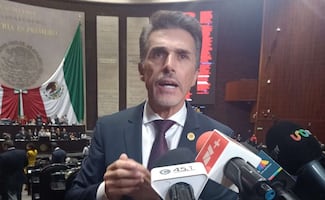Más Información

México envía nuevo cargamento con más de mil toneladas de ayuda a Cuba; zarpan dos buques desde Veracruz

Morena suspende derechos políticos de Sergio Mayer; Comisión de Honestidad señala "impacto negativo a imagen del movimiento"

Cuauhtémoc Cárdenas llama a “abrir diálogos” en marco de reforma electoral; “que las diferencias no se vuelvan enemistades”, pide

Seguridad en México rumbo al Mundial 2026; selecciones expresan preocupación y piden garantías a la FIFA

Guerra interna por nuevo liderazgo, vaticinan especialistas tras muerte de "El Mencho"; nuevo líder del CJNG no será del círculo cercano

Ataque con dron cargado con explosivos deja un guardia estatal herido en Camargo, Tamaulipas; Vocería de Seguridad pide precaución a ciudadanos
Donald Trump's plan to ban Muslims from entering the United States is shoving the Republican Party to the edge of chaos, abruptly pitting GOP leaders against their own presidential front-runner and jeopardizing the party's longtime drive to attract minorities.
Unbowed, Trump fired a searing warning Tuesday via Twitter to fellow Republicans carping about his proposal. A majority of his supporters, he tweeted, "would vote for me if I departed the GOP & ran as an independent."
With his comments calling for a ban on Muslims entering the United States, Donald Trump may be tapping into widespread antipathy toward immigration from the Middle East, a new Associated Press-GfK poll finds. The poll was conducted before Trump made his contentious proposal Monday and does not reflect public opinion about it. But it indicates a suspicion of newcomers from the region where Muslims predominate and follows last week's deadly shooting in San Bernardino, California, by a couple said by authorities to have been radicalized - with the wife having pledged allegiance to the Islamic State group.
The poll found three-quarters of Republicans thought immigration from the region was too high, with nearly as many expressing fears about the possibility that Syrian refugees will commit violence.
The crossfire between Trump and frustrated Republicans became a media blur the day after the billionaire businessman announced his plan. Beleaguered 2016 rivals condemned his proposal and complained that his divisive positions were dominating attention in the crowded Republican contest. Party elders, meanwhile, warned that too much criticism might indeed push him to launch a third-party bid that could hand the presidential election to the Democrats.
And Republicans up for re-election in the Senate grew terse in the Capitol hallways as they were asked again and again to respond to Trump's remarks - a glimpse of their political futures if the former reality show star captures the GOP nomination.
"This is not conservatism," declared House Speaker Paul Ryan, the Republican Party's top elected leader. "What was proposed yesterday is not what this party stands for. And more importantly, it's not what this country stands for."
Meanwhile, Secretary of State John Kerry said Wednesday that Trump's rhetoric is complicating U.S. diplomacy.
"I stay out of politics," he told reporters in Paris. "But on this one I have to say something because it involves my job, it involves our country."
He said that IS, also known as ISIS or Daesh, "is not Islam and there are courageous Muslims around the world in the Middle East and elsewhere standing up to it."
Kerry said that "what Mr. Trump has said runs contrary" to U.S. values of religious tolerance "and makes our job of reaching out to people and sharing America just that much more complicated and that much more difficult. And that's about as diplomatic as I can be about it."
One by one, Republican officials across the country lashed out at Trump's plan, which calls for a "total and complete shutdown of Muslims entering the United States" to help quell the threat of terrorism.
But party leaders are well aware that he could leave the GOP, run as an independent and challenge the party's presidential nominee next year. It's a threat they have long feared.
The Republican Party, said Jeb Bush adviser Ana Navarro, is stuck between "a rock and a jerk" less than eight weeks before the first primary-season votes are cast in Iowa.
In Mississippi, Republican National Committee member Henry Barbour said Trump's comments "aren't worthy of someone who wants to occupy 1600 Pennsylvania Ave." He said Trump would be a "disaster politically for the GOP if he won the nomination."
Barbour helped author the Republican National Committee's "Growth and Opportunity Project" after a painful 2012 presidential election that forced party leaders to re-evaluate their strategy in presidential contests to reflect the nation's demographic shifts. Among other things, the report cited an urgent need for GOP leaders to adopt an inclusive and welcoming tone on issues such as immigration.
Yet Trump has vaulted to the top of the Republican 2016 field by attacking immigrants in many cases. His continued popularity underscores the deep divide between Republican leaders and the party's conservative base, which holds outsized influence in the presidential nomination process.
Indeed, Trump's plan was cheered during a South Carolina rally Monday evening, and vocal supporters across the country defended the Muslim ban as necessary for national security. Polling suggests the sentiment is likely fueled by sharp strain of xenophobia: A new AP-GfK poll found 8 in 10 Republicans think there are too many immigrants coming from the Middle East.
Trump showed little concern for critics Tuesday.
"I don't care about them," he told CNN. "I'm doing what's right."
The debate left his Republican presidential competitors struggling for attention. Former technology executive Carly Fiorina flashed her frustration when asked repeatedly about Trump's comments as she campaigned in Iowa.
"Maybe you should quit focusing on Donald Trump so much," she told reporters.
Trump's position has also forced vulnerable Republicans facing re-election next year into an awkward position. Those who weighed in at all condemned his plan but also stepped carefully.
New Hampshire Sen. Kelly Ayotte said she opposes any "religious-based test for our immigration standards," but she declined to criticize Trump directly when pressed by reporters.
Some Republicans not facing election next year were less cautious.
"It does not reflect serious thought. It's not our party. It's not our country," Sen. Jeff Flake, R-Ariz. told reporters.
Noticias según tus intereses
[Publicidad]
[Publicidad]








